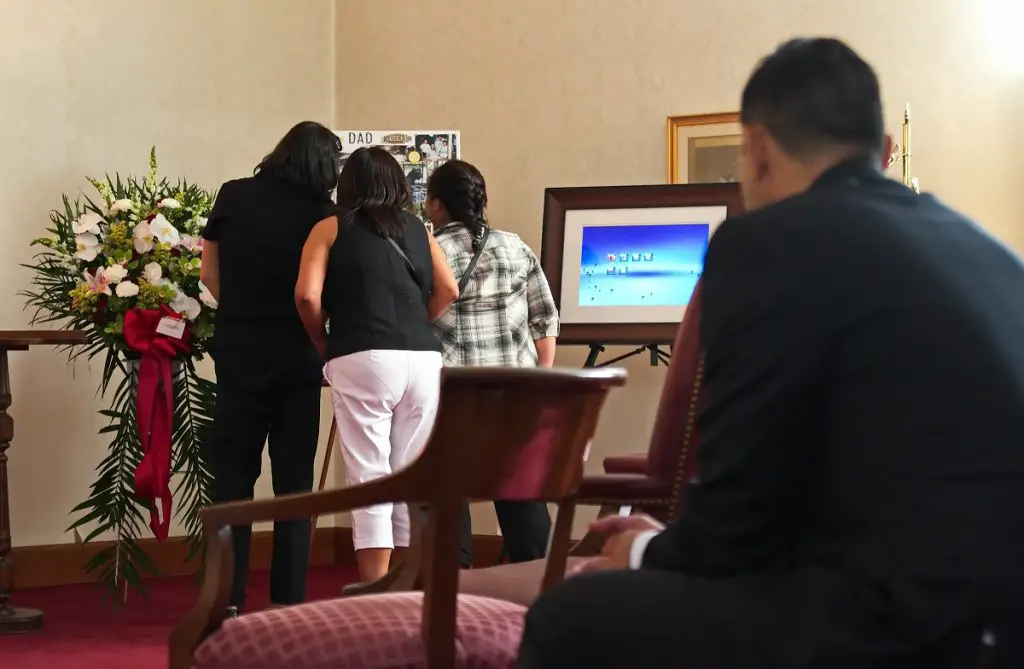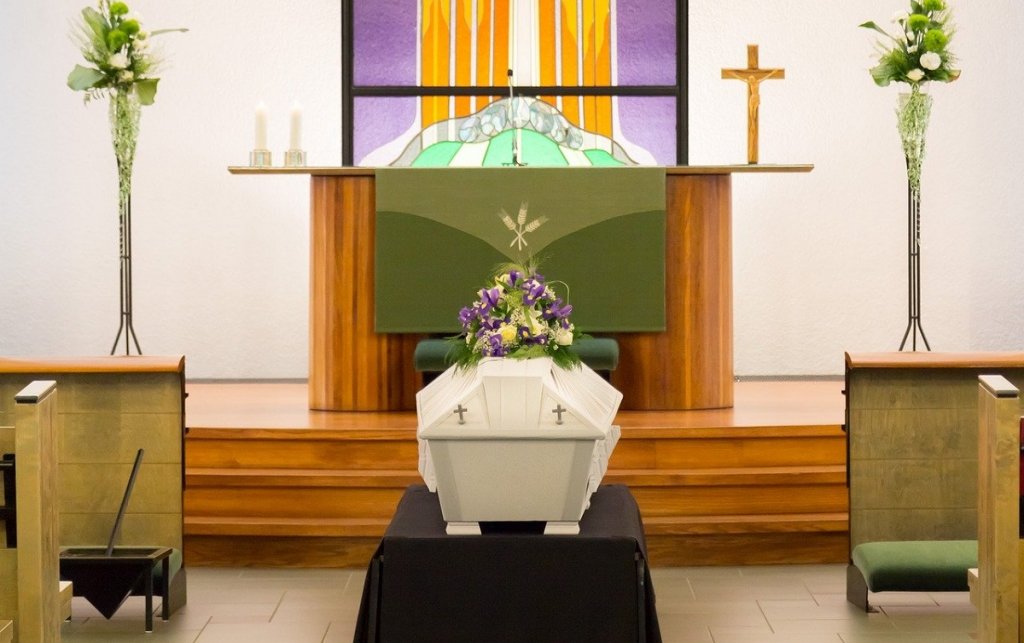Christians who belong to a variety of denominations believe in an afterlife in heaven with God. While beliefs and interpretations of the Bible vary between churches, the rituals surrounding death and funeral services are similar. The services pray for the deceased and encourage, console, and support the family and other mourners.
Whether you are attending a funeral of a Protestant or going to a Catholic funeral, most Christian funeral customs share similar etiquette, elements of the service, attitudes as to appropriate gifts, and rules for how to dress.

Table of Contents
What is The Christian Attitude Toward Death?
All Christians share in the belief that your worldly body is only a temporary vessel and that when you leave this world, you go on to another one. Of the over 2 billion Christians in the world, most of them believe in a heaven and a hell. The soul will go there at death (perhaps after a trip to Purgatory for Catholics), and eventually, the body will be resurrected as was the body of Jesus.
All Christians believe that the key to eternal salvation is accepting and loving Jesus Christ as their Lord and Savior, and some stress the importance of living a good and just life.
Given that the body is just a temporary vessel and your eternal soul is what matters, in Christianity, death should be a celebration. After all, if you believe in eternal life, you are ready to move on to enjoy the wonders of heaven.
Of course, it is customary for family and close friends to mourn the deceased person, no matter what Christian beliefs say. After all, you have suffered a great loss. Saying final goodbyes will be difficult and painful as you navigate all of the parts of the process.
But, as the Bible says, “weeping may endure for a night, but joy cometh in the morning.” Grief is a natural reaction when a loved one passes, but they have put the suffering of life behind them and are now enjoying the delights of the next world.
How Are Funeral Services Laid Out?
- Last Rites or Anointing of the Sick: When a person is near death, pray over the sick in a ritual known as Commendation of the Dying in the Lutheran church, last rites in Catholicism, or by other names depending on the faith. In the Catholic religion, the last rites are the first part of a funeral.
- Wake Service or Vigil Service: The wake or vigil is usually done within a few days of the person dying. According to Christian funeral traditions, a vigil can be held in a funeral home, at a person’s home, or at a church. Typically, if the wake is held directly preceding the funeral on the same day, the wake is held at the church where the funeral will be held. This is customarily where a friend or family member will deliver the eulogy.
- Funeral Service: There are many steps involved in the funeral rites of a Christian funeral service. There will be readings: in some religions, the casket is blessed with holy water; attendees may receive holy communion; pallbearers help bring the casket in and out of the church; and the minister or priest will deliver a sermon. The specifics of the funeral ceremony change somewhat from one religion to the next, but within Christian faiths, there are many similarities.
- Burial: Unless the family has chosen cremation, there will be a Christian burial at a cemetery. It is customary for the family to go to the grave site where there is a short graveside service. Most religions are amenable to natural and green burials.
- Reception: A meal is often served after the service. Sometimes it is only for a select group of people, but other times, everyone present at the service will be publicly invited to attend.

What Are Christian Burial Customs Regarding:
- Flowers. For Christian funerals, flowers are often sent as a show of love and to express your condolences to the family of the deceased. A grieving family can take comfort in seeing their loved one surrounded by beautiful flowers.
- Gift: Funeral etiquette allows sending gifts to the family members of the deceased. Aside from flowers, friends may present remembrances such as garden stones, wind chimes, or small figurines. Many people include a gift of money to be used as the family determines to be most appropriate.
- Burial vs. Cremation: Cremation was once viewed as a denial of the belief that the body will eventually be resurrected, so cremating the body was forbidden or somewhat controversial in many faiths. Most Christian faiths now support people if they prefer it over a traditional burial but may require the cremains to be revered in a permanent location, not scattered in the wind.
- When is the Wake Held? The wake is usually held within a few days of the person passing away. A wake, also known as a viewing or visitation, is a vigil service or a watch of the body. It can be held on afternoons or evenings before the funeral, or immediately preceding the services.
- Visitation of the Body: The body of the deceased is made available for visitation or viewing in the Christian tradition, often at the wake that takes place at a funeral home, at a private residence, or at the church. All of the Christian denominations are indifferent to whether you embalm the body or not, but most families choose to do so when there is an open casket at the wake.
- Dress Code: The dress code for a Christian religious funeral suggests wearing somber clothes such as black, navy blue, brown, or gray. Sometimes the family will encourage you to wear a certain color or dress a particular way in deference to something the deceased would have liked. Please follow their requests as this will help the grieving family.
- Format of the Service The order of service differs some from one church to the next, but most have a wake or vigil service, church funeral, and graveside service prior to burial. The rite of committal happens at the grave.
- Mourning Period: The mourning period varies slightly from one religion to the next. It is based on how close you are to the person and an individual’s personal reaction to the death.

What Is The Order Of Service At A Christian Funeral?
- Opening Music and Welcome: The funeral may start with Christian music and a welcome from the pastor. Christian funeral hymns may be used throughout the funeral.
- Blessings, Readings, and Prayers: There will be readings from favored scriptures, prayers, and blessings offered by clergy, family members, or friends.
- Sermon or Homily: The minister will give some kind of sermon based on the chosen readings. He may include the eulogy in his sermon, or that may be offered by a chosen friend or relative.
- Communion: Christian religions give communion at the services. In some churches, it is acceptable for people from outside of the religion to take communion, while in others it is not. Be sure to know the specific beliefs of the church you are visiting if you are not a member.
- Committal: The committal to the ground happens at the cemetery, not at the church. This is confusing to some people because most of us tend to think about the funeral as the part that takes place in the church when actually, it is often a multiple-day process.
Other aspects of the Christian funeral ritual may vary from one religion to the next.
What Distinguishes A Christian Funeral From Those Of Other Religions?
The biggest thing that distinguishes a Christian funeral from others is the belief in the afterlife and the resurrection of the body that will reunite it with the soul.

